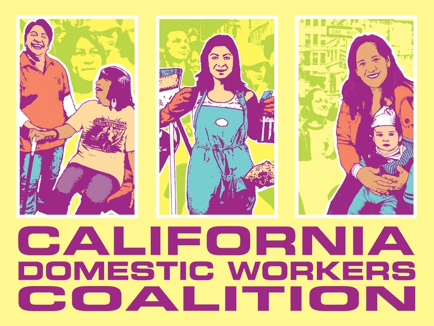After one year working on the frontlines of the pandemic without protections, home attendants, nannies, and housecleaners are continuing to organize for health and safety at their workplaces. In anticipation of the Senate Labor, Public Employment and Retirement Committee hearing of the Health and Safety for All Workers Act (SB 321), nearly a hundred domestic workers, employers, and allies gathered online to show their support for the bill, which would end the historic exclusion of domestic workers, the only group of employees to be excluded, from protections granted by the Division of Occupational Safety and Health (CAL/OSHA). The bill is sponsored by the California Domestic Workers Coalition and authored by Senator Maria Elena Durazo (D-Senate District 24). The Senate Labor, Public Employment and Retirement Committee voted in favor of the bill — 4 yes to 1 no.
Maegan Ortiz, the Executive Director of the Institute for Popular Education of Southern California, IDEPSCA spoke as one of the expert witnesses in favor of the bill. “Domestic Workers are majority immigrants and women of color and have been historically excluded from most basic labor protections. These exclusions are rooted in the legacy of slavery and the disenfranchisement of black workers from rights and protections in this country… Today, we must end one of the last vestiges of this systemic racism, by removing the household domestic service exclusion in California’s health and safety laws.”
While Deysi López, a leader of ALMAS at Graton Day Labor Center in Sonoma County, had technical difficulties on the witness line to address the Senators of the Labor Committee during the hearing, she shared her testimony with the dozens of domestic workers eager to hear her experience after the hearing: “Even before Covid, my employers put my health and safety at risk during the wildfires in Sonoma County. When cleaning windows, I was exposed to the ash leftover from the fire. This toxic substance caused me eye irritation, headache, and vomiting”. Actions to express support of the bill began last week with Call-In Days on March 19th and 22nd, and were followed by social media actions asking for the support of members of the Senate Labor Committee on the day of the hearing. Tweets and posts from domestic employers and workers alike, illustrated the message clearly: SB 321 would provide protections meant to prevent the injury and illness of this rapidly growing essential workforce that are needed now more than ever with the current pandemic and wildfire season on the horizon. This is the second time a similar version of this bill has passed the Senate Labor Committee and domestic workers remain hopeful that this year it will be signed into law.
“Domestic workers are essential workers, and they deserve to be treated with dignity and respect in their workplace at the same standard that we expect from other industries,” said Senator María Elena Durazo (D-Los Angeles), the bill’s author, after the hearing. “We have to end this deeply unjust discrimination to a workforce made up primarily of immigrant women. Today’s Labor Committee vote represents an important step forward for this much-needed legislation to protect domestic workers that should have been signed into law last year.”
Many domestic employers have also supported the bill since the beginning of the campaign last year. “Nannies, house cleaners, and home attendants provide essential support to an estimated 2 million Californian households, enabling Californians to go to work, live in their homes- rather than go into a nursing home- and take care of their loved ones,” said Lindsay Imai Hong, California Director of Hand in Hand: The Domestic Employers Network, in agreement that ending this exclusion would also protect employers. “The COVID pandemic has demonstrated, even more clearly, how the health of domestic workers and their employers are connected. SB 321 would provide domestic employers with needed guidance on how to ensure their homes are safe workplaces- protecting both domestic workers and the families that employ them.”
The bill will be heard next by the Senate Judiciary Committee on Tuesday, April 6.
